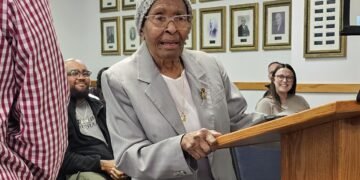Courtesy of Kentucky Lantern
FRANKFORT — The GOP-dominated Kentucky legislature easily overrode nearly all of Democratic Kentucky Gov. Andy Beshear’s vetoes Friday on the next to last day of this year’s legislative session, cementing a number of Republican priorities into state law.
In total, Republican supermajorities in both legislative chambers overrode two dozen vetoes of bills and a resolution, including overriding nearly all line-item vetoes of budgetary bills funding state government.
Democratic lawmakers pushed back, unsuccessfully urging Republicans to uphold the vetoes on a number of bills including a sweeping crime bill, a bill creating more barriers to retire fossil fuel-fired power plants in Kentucky, and a bill changing how U.S. Senate vacancies are filled.
The legislation with overridden vetoes will now become state law with the signature of Republican Secretary of State Michael Adams. Here are some of the key vetoes the legislature overrode.
Budget bills
Bills funding the state executive branch to the tune of $128 billion, funding the state legislative and judicial branches and road projects saw multiple line-item vetoes from Beshear.

The governor took issue with a number of provisions in House Bill 6, legislation funding state cabinets and agencies. He vetoed provisions that capped executive branch spending to respond to disasters and forest fires, mandated reports to the legislature about the governor’s executive orders and required state executive branch officials get permission from the state treasurer to use state-owned planes for out-of-state travel.
“Executive orders by their very nature are within the Executive Branch’s authority as set forth in the Kentucky Constitution,” Beshear wrote in vetoing HB 6. “The information requested to be provided by the Executive branch in this provision far exceeds anything the Legislative branch has required under its own procedures during the 2024 Regular Session.”
Both chambers of the legislature overrode nearly all line-item vetoes in state budgetary bills. They sustained a veto of requiring the Kentucky Department for Natural Resources to create a report on abandoned and active coal mine reclamation projects.
Rep. Lindsey Burke, D-Lexington, echoed Beshear’s concerns on the House floor, saying “it’s not enough to say we’ll come back and have a special session when people are in crisis.”
“They need a crisis level response. The governor is right: we should sustain his veto as it relates to responding to natural disasters,” Burke said.

Sen. Chris McDaniel, R-Ryland Heights, said the arguments against the funding limits for natural disasters were “specious” considering the next state fiscal year for the budget begins in July and that the legislature will reconvene for its next legislative session in about six months.
Some of the reporting requirements and studies that we direct are important,” McDaniel said, mentioning the legislature’s desire to gather more data on Kentucky State Police operations and the Medicaid waiver program.
House Bill 5
The House easily overrode Beshear’s veto of House Bill 5, an omnibus crime bill backed by Jefferson County Republicans in a vote of 73-22. The bill went straight to the Senate, whose members voted 27-10 to override the veto.
Beshear vetoed the bill earlier this week. He told reporters Thursday that he supported some parts of the bill, such as the carjacking statute and flexibility for the Kentucky Parole Board, but other parts concerned him.
“This bill has a number of good sections, but I do believe it was cruel to put some of these sections that would have received unanimous approval with others that individuals knew would have been controversial,” Beshear said.
The governor added that he had been in Louisville this week to mark the one-year anniversary of the Old National Bank shooting that killed five victims, including a personal friend of his. He noted that one provision of the bill would allow for weapons used in murders to be destroyed after an auction sale.

He criticized one of the most controversial sections of the bill — making street camping a crime in Kentucky. Advocates have argued that would largely impact people who are homeless. Beshear said several ministers contacted him about the issue.
“I could not in good conscience, with my faith, sign a bill that would virtually criminalize homelessness and would treat an abandoned car better than a car that had a person in it who was suffering from homelessness,” the governor said.
Beshear expressed concern about the financial impacts of increasing incarceration in Kentucky — an issue that falls to the executive branch. Lawmakers are also finalizing the next two-year state budget this session. The governor criticized a limitation included that prevents his administration from delving “into unnecessary government expenses if our correction costs go over.”
Advocates from both right and left think tanks said the legislature should have an in-depth fiscal analysis before implementing the legislation. Beshear said his administration tried to give an estimate to the General Assembly but it “never published it — at all.”
When the veto override vote was being considered in the Senate, Sen. John Schikel, R-Union, said the supporters of HB 5 are “dealing with real life” and not “hypotheticals about homeless people.”
Senate Bill 299
Legislation backed by Republican leadership in the General Assembly would dissolve the Kentucky Horse Racing Commission and Department of Charitable Gaming and create a new government corporation to oversee those duties. The Senate overrode Beshear’s veto of Senate Bill 299 and forwarded it to the House Friday afternoon.
Beshear vetoed the bill because he viewed it as an “unnecessary and unworkable bill, and its unintended consequences would tremendously affect horse racing, sports wagering and charitable gaming industries and the ability of people to serve on the newly-created corporation,” he wrote in his veto message.
The governor told reporters that a conversation should be had about the move during the legislative interim session and pointed out that it was finalized shortly before the veto period began.
“The Public Protection Cabinet worked so hard to get sportsbetting launched,” Beshear said. “They brought all of their resources to bear and look at how well it’s gone. There’s that old axiom, ‘if it ain’t broke,’ right? If it ain’t broke, don’t fix it.”
House Bill 622
Beshear vetoed a measure that would end the governor’s power to fill U.S. Senate vacancies, House Bill 622. In his veto message, the governor wrote that the General Assembly had passed legislation in 2021 to change the process and criticized it for changing “its mind for the second time in three years.”
“This administration deserves the same authority as previous administrations,” Beshear continued.
Unsurprisingly, the House and Senate disagreed with him and overrode his veto Friday. The bill had passed through both chambers with bipartisan support.
Senate Bill 349

Both chambers of the legislature overrode Beshear’s veto of a bill, Senate Bill 349, backed by Senate President Rorbert Stivers, R-Manchester, creating new hurdles before utilities can retire fossil fuel-fired power plants.
SB 349 will create a new commission, whose membership would include significant fossil fuel interests, that utilities would have to give notice to about plans to retire a fossil fuel-fired power plant before officially filing such a plan before the state’s utility regulator, the Kentucky Public Service Commission.
This commission would create a report for each retirement request analyzing the impacts of and alternatives to the request, including impacts to the state’s electricity supply and whether the retirement would create a “loss of revenue” for local and state government.
Environmental advocacy groups and Investor-owned utilities including Louisville Gas and Electric and Kentucky Utilities (LG&E and KU) have decried SB 349 as potentially burdening ratepayers with the costs of keeping aging, uneconomical coal-fired power plants on the power grid. Proponents, including national coal industry interests, have backed the bill as a way to secure the reliability of the state’s power grid, an assertion rebuffed by the president of LG&E and KU.
Beshear’s veto message rejecting SB 349 said he agreed Kentucky “must have energy reliability” but said the new commission wasn’t the right solution, was unconstitutional and something that instead could “jeopardize economic development.”
Kentucky Lantern is part of States Newsroom, the nation’s largest state-focused nonprofit news organization.

















